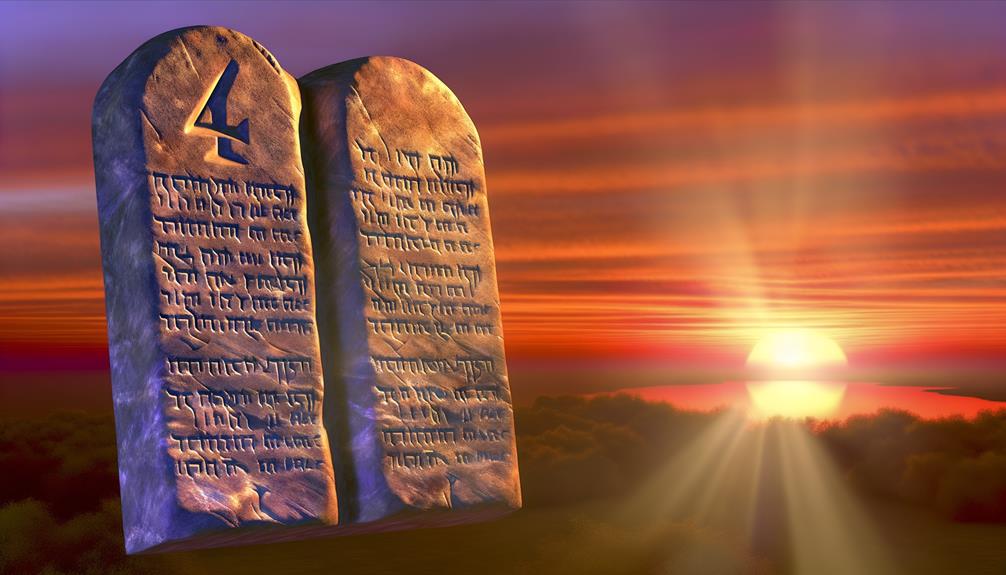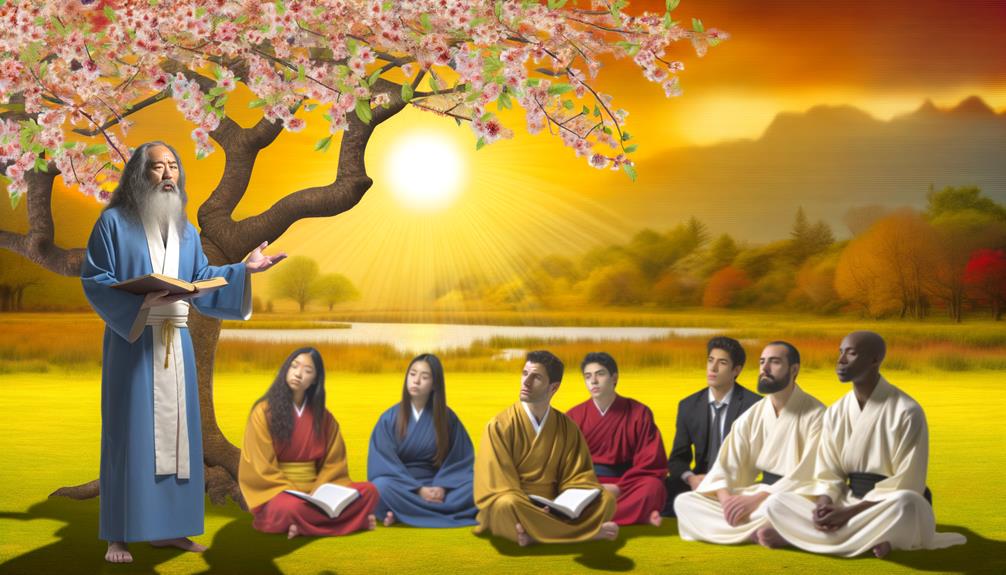Seventh Day Meaning in Bible: Rest and Completion
In the Bible, the seventh day, or Sabbath, is imbued with deep theological and historical significance. God sanctified this day in Genesis 2:2-3, marking it as a time of rest reflecting divine completion and holiness.
This concept is reiterated in the Ten Commandments (Exodus 20:8-11), where it is presented as a perpetual covenant symbolizing the Creator’s rest after creation. The Sabbath underscores a rhythm of rest and renewal, fostering spiritual significance and communal worship.
Jesus’ teachings later highlight its purpose for human well-being. To truly grasp its multifaceted importance, exploring further nuances is essential.

Seventh Day Meaning in the Bible: Symbolism of Rest, Completion, and Covenant with God
| Aspect | Biblical Meaning |
|---|---|
| Day of Rest (Sabbath) | The seventh day is the Sabbath, a day of rest ordained by God after the six days of creation. It symbolizes rest, reflection, and honoring God’s completed work (Genesis 2:2-3). |
| Divine Completion | The seventh day represents completion and perfection, as God finished His creation and declared it “very good,” symbolizing divine order and fulfillment (Genesis 1:31). |
| Covenant with God | The Sabbath is part of the covenant between God and His people, a sign of their special relationship and commitment to follow His commandments (Exodus 31:16-17). |
| Spiritual Renewal | The seventh day is meant for spiritual renewal and reconnecting with God, allowing believers to rest from their labors and focus on worship and reflection (Isaiah 58:13-14). |
| Foreshadowing Eternal Rest | The seventh day Sabbath is seen as a foreshadowing of the eternal rest and peace that believers will experience in God’s Kingdom, a symbol of spiritual rest in Christ (Hebrews 4:9-10). |
Genesis and Creation

In the Book of Genesis, the account of creation culminates with God sanctifying the seventh day as a day of rest, establishing its profound theological significance. This act is recorded in Genesis 2:2-3, where God ceases from His creative work, blessing and hallowing the seventh day.
This divine rest is not due to fatigue but serves as a divine pattern for humanity, highlighting the intrinsic value of rest and reflection. Theologically, this sanctification introduces the concept of sacred time, setting a precedent for future Sabbath observance.
Historically, it delineates a rhythm of life that integrates work and rest, emphasizing the importance of dedicating time to spiritual renewal and communion with the Creator. This foundational text underscores the symbiotic relationship between creation, rest, and holiness.
The Sabbath Commandment

The Sabbath commandment, rooted in the biblical narrative of creation, is first articulated in Exodus 20:8-11, where it is enshrined as a day of rest and sanctity.
Its observance reflects a deep theological significance, symbolizing God’s rest after creation and serving as a covenantal sign between God and Israel.
Historically, the Sabbath has been central to Jewish religious life, shaping communal practices and influencing Christian Sabbath observance.
Biblical Sabbath Origins
Rooted in the creation narrative, the biblical Sabbath commandment emerges as a divine ordinance established in Genesis 2:2-3, where God sanctified the seventh day as a day of rest.
This consecration signifies a cessation from the six days of creation work, underscoring a rhythm of labor and repose intrinsic to human existence.
Theological exegesis reveals that this divine rest serves both as a memorial of creation and a covenantal sign between God and His people.
Historically, the Sabbath’s importance is further emphasized in Exodus 20:8-11, where it is enshrined within the Decalogue.
This dual emphasis—creation and covenant—illuminates the Sabbath’s foundational role in Hebrew theology, marking it as a perpetual ordinance for divine-human relationship.
Observance and Practices
Adherents of the biblical Sabbath observe the commandment through a structured cessation from labor, dedicating the seventh day to rest, worship, and reflection, as detailed in scriptural mandates and historical traditions. This observance is rooted in the Fourth Commandment, found in Exodus 20:8-11, which underscores the sanctity of the Sabbath. Theological interpretations often highlight the Sabbath as a covenantal sign between God and His people, fostering a rhythm of work and rest reflective of divine creation. Historically, practices have included communal worship, studying sacred texts, and engaging in familial and communal bonds.
| Aspect | Scriptural Reference |
|---|---|
| Cessation of Labor | Exodus 20:10 |
| Day of Rest | Genesis 2:2-3 |
| Worship and Reflection | Leviticus 23:3 |
| Covenant Sign | Exodus 31:16-17 |
| Sanctification | Isaiah 58:13-14 |
Rest and Renewal

The concept of rest and renewal, as established in the Biblical Sabbath, finds its origins in Genesis 2:2-3, where God ceased from His creative work and sanctified the seventh day.
This divine precedent underscores the theological importance of rest, not merely as physical cessation but as a profound spiritual restoration practice.
Historically, the observance of the Sabbath has fostered a rhythm of life that integrates worship, reflection, and communal rejuvenation, aligning believers with the sacred rhythms ordained by God.
Biblical Sabbath Origins
Tracing its origins to the creation narrative in the Book of Genesis, the Biblical Sabbath represents a divinely instituted day of rest and renewal.
Genesis 2:2-3 notes, “And on the seventh day God ended His work which He had done, and He rested… Then God blessed the seventh day and sanctified it.” This scriptural foundation underscores the Sabbath as a cessation from labor, symbolizing divine completion and sanctification.
Historically, the Sabbath tradition was reinforced through Mosaic Law, particularly in Exodus 20:8-11, where the Fourth Commandment enjoins Israel to remember and keep the Sabbath holy.
This theological emphasis on rest and renewal reflects God’s rhythm for creation, offering a pattern for human spiritual and physical rejuvenation.
Spiritual Restoration Practices
In the context of spiritual restoration, the Sabbath serves as an important practice enabling believers to engage in intentional rest and renewal, reflecting the divine rhythm established at creation.
In Genesis 2:2-3, God sanctified the seventh day, setting a precedent for holistic rest. Historically, this practice was further codified in Exodus 20:8-11, emphasizing cessation from labor to focus on spiritual rejuvenation.
Theologically, the Sabbath invites a reflection on God’s creative and redemptive works, fostering a deeper communion with the divine. Through rest, believers are restored, both physically and spiritually, aligning with Jesus’ affirmation in Mark 2:27 that ‘the Sabbath was made for man.’
Consequently, Sabbath observance becomes a profound act of faith and obedience, crucial for spiritual vitality.
Spiritual Significance

Examining the seventh day within biblical scripture reveals profound spiritual significance, particularly as it symbolizes divine rest and sanctification.
In Genesis 2:2-3, God ceases His creative work, blessing and sanctifying the seventh day, establishing a divine precedent for rest. This act of cessation is not merely physical but imbued with spiritual meaning, reflecting completion and divine satisfaction.
Historically, the Sabbath becomes a covenantal sign between God and Israel in Exodus 31:13, emphasizing its role in spiritual identity and divine relationship.
Theologically, this day embodies holiness, inviting believers to emulate God’s rest and engage in reflective worship.
The spiritual significance of the seventh day consequently integrates rest, sanctification, and divine communion into a holistic biblical understanding.
Jesus and the Sabbath

Jesus’ approach to the Sabbath, as depicted in the Gospels, offers a transformative perspective that underscores the principles of mercy, restoration, and the true intent of divine law.
His actions, such as healing on the Sabbath (Mark 3:1-6) and allowing his disciples to pluck grain (Matthew 12:1-8), challenge the Pharisaic legalism that had overshadowed the day’s intended purpose.
Jesus emphasized that ‘The Sabbath was made for man, not man for the Sabbath’ (Mark 2:27), highlighting its role in human well-being rather than rigid observance.
Prophetic Insights

Prophetic insights into the seventh day in the Bible reveal profound theological implications that extend beyond mere ritualistic observance, anchoring it in the eschatological hope and divine promise of ultimate rest and restoration.
Isaiah 66:22-23 envisions a new heavens and a new earth where all flesh will worship before God on the Sabbath, reflecting an eternal covenant.
Hebrews 4:9-10 connects Sabbath rest to the ultimate rest believers enter through faith in Christ, drawing parallels with God’s rest after creation.
Throughout prophetic literature, the Sabbath symbolizes a future fulfillment of God’s kingdom, where peace and divine fellowship are fully realized.
This eschatological perspective enriches the Sabbath’s significance, transcending its immediate historical and liturgical context.
Modern Relevance

Understanding the modern relevance of the seventh day in the Bible necessitates a thorough exploration of its theological, scriptural, and historical dimensions.
Theologically, the Sabbath underscores divine rest and sanctification, inviting contemporary believers to embrace a rhythm of work and rest.
Scripturally, passages such as Genesis 2:2-3 and Exodus 20:8-11 highlight the sanctity and observance of the seventh day as a perpetual covenant.
Historically, the practice of Sabbath-keeping has shaped Jewish and Christian traditions, providing a foundation for community and spiritual renewal.
In today’s fast-paced society, the seventh day remains a profound reminder of the need for rest, reflection, and reverence, fostering a deeper connection with the divine and promoting holistic well-being.
Conclusion
The seventh day, as depicted in biblical scripture, emerges as a profound symbol of divine rest and sanctification.
Rooted in the Genesis narrative and codified in the Sabbath Commandment, it serves as a sacred interval for spiritual rejuvenation and reflection.
With prophetic undertones and affirmed by Jesus’ teachings, the seventh day transcends mere ritual, embodying eternal themes of rest, renewal, and divine covenant.
Its contemporary relevance invites ongoing theological exploration and spiritual observance.






